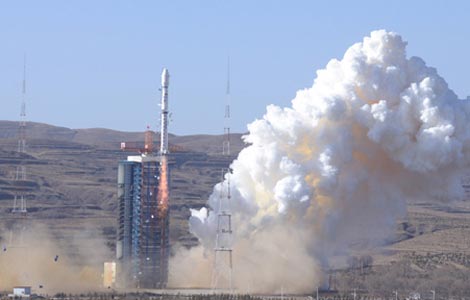China's position paper on South China Sea
Updated: 2014-12-07 10:20
(Xinhua)
|
||||||||
IV. Even assuming, arguendo, that the subject-matter of the arbitration were concerned with the interpretation or application of the Convention, that subject-matter would still be an integral part of maritime delimitation and, having been excluded by the 2006 Declaration filed by China, could not be submitted for arbitration
57. Part XV of the Convention establishes the right for the States Parties to file a written declaration to exclude specified categories of disputes from the compulsory dispute settlement procedures as laid down in section 2 of that Part. In 2006 China filed such a declaration in full compliance with the Convention.
58. On 25 August 2006, China deposited, pursuant to Article 298 of the Convention, with Secretary-General of the United Nations a written declaration, stating that, "The Government of the People' s Republic of China does not accept any of the procedures provided for in section 2 of Part XV of the Convention with respect to all the categories of disputes referred to in paragraph 1 (a), (b) and (c) of Article 298 of the Convention" . In other words, as regards disputes concerning maritime delimitation, historic bays or titles, military and law enforcement activities, and disputes in respect of which the Security Council of the United Nations is exercising the functions assigned to it by the Charter of the United Nations, the Chinese Government does not accept any of the compulsory dispute settlement procedures laid down in section 2 of Part XV of the Convention, including compulsory arbitration. China firmly believes that the most effective means for settlement of maritime disputes between China and its neighbouring States is that of friendly consultations and negotiations between the sovereign States directly concerned.
59. China and the Philippines are maritime neighbours and "States with opposite or adjacent coasts" in the sense of Articles 74 and 83 of the Convention. There exists an issue of maritime delimitation between the two States. Given that disputes between China and the Philippines relating to territorial sovereignty over relevant maritime features remain unresolved, the two States have yet to start negotiations on maritime delimitation. They have, however, commenced cooperation to pave the way for an eventual delimitation.
60. On 3 September 2004, the two sides issued a Joint Press Statement of the Government of the People' s Republic of China and the Government of the Republic of the Philippines, stating that "[t]he two sides reaffirmed their commitment to the peace and stability in the South China Sea and their readiness to continue discussions to study cooperative activities like joint development pending the comprehensive and final settlement of territorial disputes and overlapping maritime claims in the area" (para. 16).
61. Two days before the issuance of the Joint Press Statement, upon approval by both governments and in the presence of the Heads of State of the two countries, China National Offshore Oil Corporation and Philippine National Oil Company signed the "Agreement for Joint Marine Seismic Undertaking in Certain Areas in the South China Sea" . On 14 March 2005, the agreement was expanded to a tripartite agreement, with the participation of Vietnam Oil and Gas Corporation. This is a good example of the constructive efforts made by the States concerned to enhance cooperation and create conditions for a negotiated settlement of the disputes in the South China Sea. The maritime area covered by that agreement is within that covered in the present arbitration initiated by the Philippines.
62. On 28 April 2005, during a State visit to the Philippines by the then Chinese President Hu Jintao, China and the Philippines issued a Joint Statement of the People' s Republic of China and the Republic of the Philippines, in which the two sides "agreed to continue efforts to maintain peace and stability in the South China Sea and ... welcomed the signing of the Tripartite Agreement for Joint Marine Seismic Undertaking in the Agreement Area in the South China Sea by China National Offshore Oil Corporation, Vietnam Oil and Gas Corporation and Philippine National Oil Company" (para. 16).
63. On 16 January 2007, during the official visit to the Philippines by the then Chinese Premier Wen Jiabao, China and the Philippines issued a Joint Statement of the People' s Republic of China and the Republic of the Philippines, which stated that "the Tripartite Joint Marine Seismic Undertaking in the South China Sea serves as a model for cooperation in the region. They agreed that possible next steps for cooperation among the three parties should be explored to bring collaboration to a higher level and increase the momentum of trust and confidence in the region" (para. 12).
64. In light of the above, it is plain that China and the Philippines have reached mutual understanding to advance final resolution of the issue of maritime delimitation through cooperation. In any event, given China' s 2006 declaration, the Philippines should not and cannot unilaterally initiate compulsory arbitration on the issue of maritime delimitation.
65. To cover up the maritime delimitation nature of the China-Philippines dispute and to sidestep China' s 2006 declaration, the Philippines has split up the dispute of maritime delimitation into discrete issues and selected a few of them for arbitration, requesting the Arbitral Tribunal to render the so-called "legal interpretation" on each of them.
66. It is not difficult to see that such legal issues as those presented by the Philippines in the present arbitration, including maritime claims, the legal nature of maritime features, the extent of relevant maritime rights, and law enforcement activities at sea, are all fundamental issues dealt with in past cases of maritime delimitation decided by international judicial or arbitral bodies and in State practice concerning maritime delimitation. In short, those issues are part and parcel of maritime delimitation.
67. Maritime delimitation is an integral, systematic process. Articles 74 and 83 of the Convention stipulate that maritime delimitation between States with opposite or adjacent coasts "shall be effected by agreement on the basis of international law, as referred to in Article 38 of the Statute of the International Court of Justice, in order to achieve an equitable solution" . Both international jurisprudence and State practice have recognized that all relevant factors must be taken into account to achieve an equitable solution. In this light, the international law applicable to maritime delimitation includes both the Convention and general international law. Under this body of law, maritime delimitation involves a consideration of not only entitlements, effect of maritime features, and principles and methods of delimitation, but also all relevant factors that must be taken into account, in order to attain an equitable solution.
68. The issues presented by the Philippines for arbitration constitute an integral part of maritime delimitation between China and the Philippines, and, as such, can only be considered under the overarching framework of maritime delimitation between China and the Philippines, and in conjunction with all the relevant rights and interests the parties concerned enjoy in accordance with the Convention, general international law, and historical or long-standing practice in the region for overall consideration. The Philippines' approach of splitting its maritime delimitation dispute with China and selecting some of the issues for arbitration, if permitted, will inevitably destroy the integrity and indivisibility of maritime delimitation and contravene the principle that maritime delimitation must be based on international law as referred to in Article 38 of the ICJ Statute and that "all relevant factors must be taken into account" . This will adversely affect the future equitable solution of the dispute of maritime delimitation between China and the Philippines.
69. Ostensibly, the Philippines is not seeking from the Arbitral Tribunal a ruling regarding maritime delimitation, but instead a decision, inter alia, that certain maritime features are part of the Philippines' EEZ and continental shelf, and that China has unlawfully interfered with the enjoyment and exercise by the Philippines of sovereign rights in its EEZ and continental shelf. But that obviously is an attempt to seek a recognition by the Arbitral Tribunal that the relevant maritime areas are part of the Philippines' EEZ and continental shelf, in respect of which the Philippines is entitled to exercise sovereign rights and jurisdiction. This is actually a request for maritime delimitation by the Arbitral Tribunal in disguise. The Philippines' claims have in effect covered the main aspects and steps in maritime delimitation. Should the Arbitral Tribunal address substantively the Philippines' claims, it would amount to a de facto maritime delimitation.
70. The exclusionary declarations filed by the States Parties to the Convention under Article 298 of the Convention must be respected. By initiating the present compulsory arbitration as an attempt to circumvent China' s 2006 declaration, the Philippines is abusing the dispute settlement procedures under the Convention.
71. China' s 2006 declaration, once filed, automatically comes into effect. Its effect, as prescribed under Article 299 of the Convention, is that, without the consent of China, no State Party can unilaterally invoke any of the compulsory procedures specified in section 2 of Part XV against China in respect of the disputes covered by that declaration. In return, China simultaneously gives up the right to unilaterally initiate compulsory procedures against other States Parties in respect of the same disputes. The rights and obligations are reciprocal in this regard.
72. The Philippines claims that, having chosen none of the four compulsory dispute settlement procedures listed under Article 287 of the Convention, China as a State Party shall therefore be deemed to have accepted compulsory arbitration. This is a deliberately misleading argument. The purpose and the effect of China' s 2006 declaration is such that the disputes listed therein are fully excluded from the compulsory settlement procedures under the Convention. Whether or not China has selected any of the four compulsory procedures under Article 287, as long as a dispute falls within the scope of China' s 2006 declaration, China has already explicitly excluded it from the applicability of any compulsory procedures under section 2 of Part XV of the Convention, including compulsory arbitration.
73. Although the Philippines professes that the subject-matter of the arbitration does not involve any dispute covered by China' s 2006 declaration, since China holds a different view in this regard, the Philippines should first take up this issue with China, before a decision can be taken on whether or not it can be submitted for arbitration. Should the Philippines' logic in its present form be followed, any State Party may unilaterally initiate compulsory arbitration against another State Party in respect of a dispute covered by the latter' s declaration in force simply by asserting that the dispute is not excluded from arbitration by that declaration. This would render the provisions of Article 299 meaningless.
74. Since the entry into force of the Convention, the present arbitration is the first case in which a State Party has unilaterally initiated compulsory arbitration in respect of a dispute covered by a declaration of another State Party under Article 298. If this twisted approach of the Philippines could be accepted as fulfilling the conditions for invoking compulsory arbitration, it could be well imagined that any of the disputes listed in Article 298 may be submitted to the compulsory procedures under section 2 of Part XV simply by connecting them, using the Philippines' approach, with the question of interpretation or application of certain provisions of the Convention. Should the above approach be deemed acceptable, the question would then arise as to whether the provisions of Article 298 could still retain any value, and whether there is any practical meaning left of the declarations so far filed by 35 States Parties under Article 298. In light of the foregoing reasons, China can only conclude that, the unilateral initiation by the Philippines of the present arbitration constitutes an abuse of the compulsory procedures provided in the Convention and a grave challenge to the solemnity of the dispute settlement mechanism under the Convention.
75. To sum up, even assuming that the subject-matter of the arbitration were concerned with the interpretation or application of the Convention, it would still be an integral part of the dispute of maritime delimitation between the two States. Having been excluded by China' s 2006 declaration, it could not be submitted to compulsory arbitration under the Convention.

 China, Brazil pledge to promote science, technology co-op
China, Brazil pledge to promote science, technology co-op
 ZTE, NBA team partners in business, charity
ZTE, NBA team partners in business, charity
 'Big' Peking opera staged in New York
'Big' Peking opera staged in New York
 250 Santas hit slopes for charity
250 Santas hit slopes for charity
 Jack Ma awarded Honorary Chairman of Zhejiang Chamber of Commerce
Jack Ma awarded Honorary Chairman of Zhejiang Chamber of Commerce
 2014 Yearender: Life underground
2014 Yearender: Life underground
 South China's 'little Africa'
South China's 'little Africa'
 Trending: Eiffel Tower replica in Hangzhou
Trending: Eiffel Tower replica in Hangzhou
Most Viewed
Editor's Picks

|

|

|

|

|

|
Today's Top News
Illinois university signs agreements with Chinese college
ZTE, NBA team partner in business, charity
Chinese investors in Brazil told to avoid risks
Economists call for increased public spending in China
Xiaomi's smartphone taps into US market
Peruvian product hit in Chinese market
Chinese role expected in Mexico's energy reform
Brazil film festival delights Beijing and Shanghai
US Weekly

|

|







